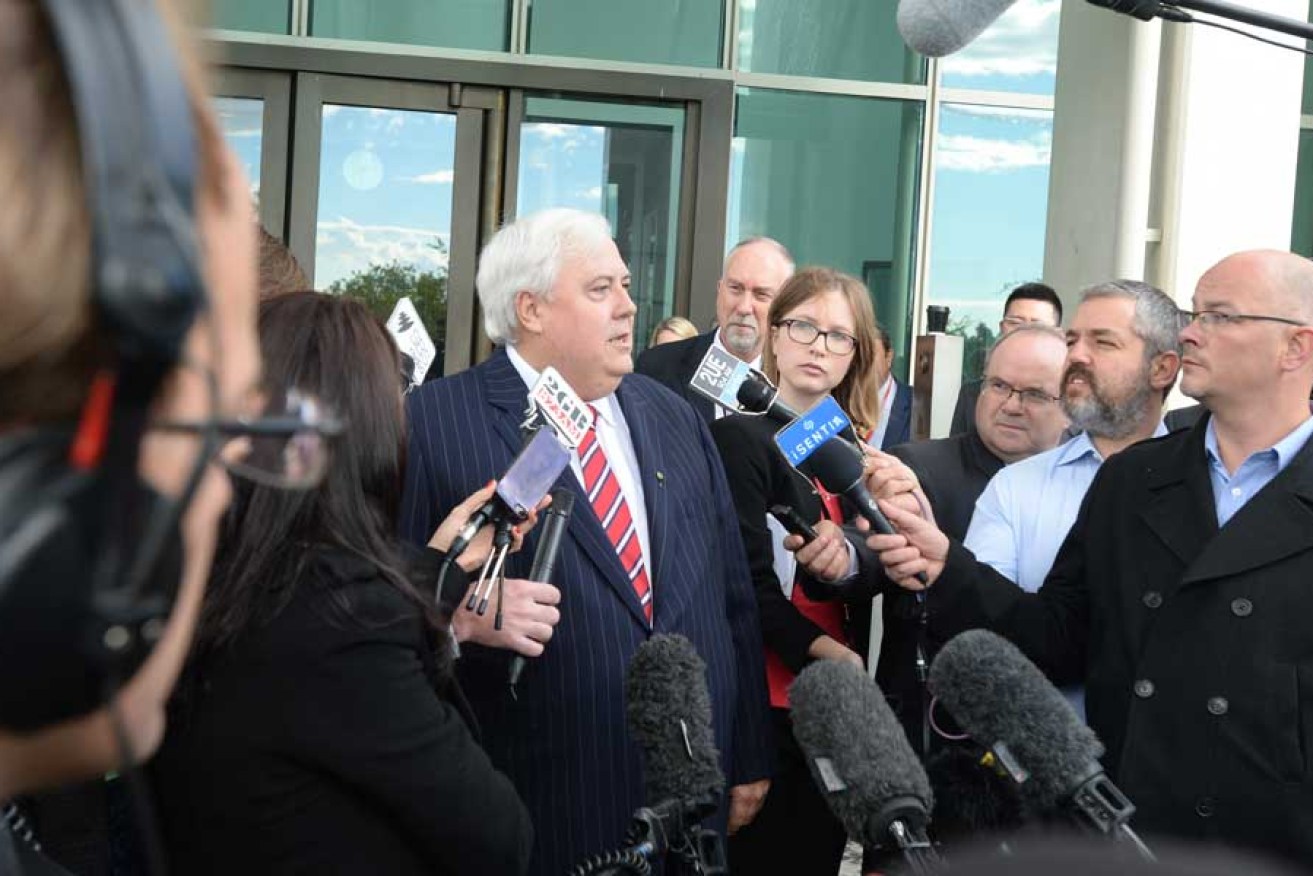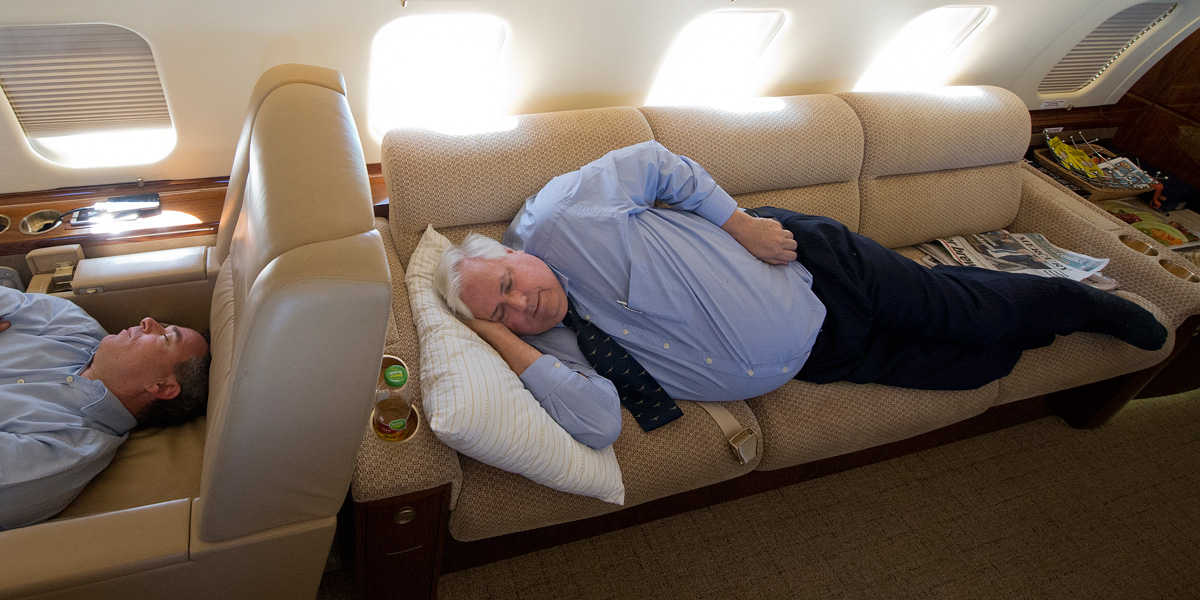Clive Palmer quietly exits politics
Clive Palmer today announced he is formally waving goodbye to politics and disbanding his political party. Don Woolford looks back on how his political fortunes crumbled quickly after his stunning success at the 2013 election.

Clive Palmer arrives for the opening of the 44th parliament at Parliament House in Canberra. AAP image
Australia has never experienced anyone quite like Clive Palmer.
He’s been big in every sense – in business, in politics, above all in his outrageous zest for life.
Pull off huge mining deals with the Chinese, bankroll a political party or a soccer team, feud on a grand scale, control the balance of power in the Senate, plan a replica of the Titanic, litter a golf course with robotic dinosaurs – nothing has been too off the planet for the big Queenslander.
Yet much of it turned to dust.
Palmer’s first fortune came through real estate deals. He retired before he was 30, with about $40 million.
But he was soon bored and in 1984 he set up Mineralogy, which became his main vehicle for making really serious money.
And that came largely from his snapping up dirt cheap a Pilbara iron ore tenement after its American owners failed to pay the rent.
Later he sold the mining rights to Chinese steelmaker CITIC Pacific for a $200 million upfront payment plus hefty royalties.
More acquisitions followed, including coal deposits in Queensland’s Galilee Basin, a nickel refinery and oil and gas interests in Papua New Guinea.
Easy come, easy go.
Palmer bought luxury homes, top of the range cars, an executive jet. He bought the A-League Gold Coast soccer club which he ran erratically. It was finally closed down by Football Federation Australia boss Frank Lowy, an even more serious billionaire. Palmer branded him a dictator.
He bought the Coolum Resort, with its top class golf course and turned it into a “Palmersaurus”, spearheaded by “Jeff”, a 20-metre robotic T-Rex.
But the Australian PGA championship was withdrawn from the course and owners of villas on the resort took Palmer to court, claiming they were being locked out.
Then there was his Titanic fantasy – a replica to be built in China and in 2018 to repeat the Southampton to New York voyage of its doomed original. By 2017, however, there was no sign of progress on the massive project.

Clive Palmer taking a break on board his aircraft during the 2013 election campaign.
Politics, probably, consumed Palmer most.
He was a long-time member of the Queensland Nationals, becoming its most important donor and holding senior party positions. He was honoured with life membership.
After the LNP returned to power in Queensland in 2012, however, Palmer was soon feuding, especially with deputy premier Jeff Seeney. He also fought with Tony Abbott over Palmer’s attempt to block lobbyists from positions of influence in the party.
Palmer flirted with running for the LNP against Labor federal treasurer Wayne Swan – an “intellectual pygmy” – in the Brisbane seat of Lilley in the 2013 election. Abbott discouraged the move.
After more bad blood, which included charges of corruption by Palmer, he was suspended from the LNP. Critics claimed Palmer tried to buy the party and turned on it when it wouldn’t do his bidding.
So Palmer formed his own party, the Palmer United Party, or PUP as it was universally called, and opened his pockets again.
He found candidates to run in all 150 lower house seats as well as for the Senate. He ran in the Sunshine Coast seat of Fairfax, which contained his Coolum resort and whose Liberal member was retiring. Overall, he spent a reported $25 million, far more than the major parties.
Palmer won Fairfax by the skin of his teeth and his candidates won three Senate seats – former rugby league international Glenn Lazarus in Queensland, Tasmanian former soldier Jacqui Lambie, and from Western Australia a former Palmer company executive Zhenya (Dio) Wang.
This big, rich, rambunctious character suddenly controlled the balance of power in the Senate, even if he wasn’t in that house himself. And for a time PUP used its pivotal numbers brutally. It did do deals with the government to get rid of the carbon and mining taxes.
Palmer also had MPs in the Queensland and Northern Territory parliaments who’d defected from the conservatives.
But PUP started unravelling almost as quickly as it had come together.
Lambie, abrasively independent, quit first. Lazarus, complaining that Palmer was a bully – and also irked because his wife had been sacked from a party job – went soon afterwards.
With only Wang left in the Senate, PUP’s bargaining powers disappeared.
His MPs in Queensland and the Northern Territory also left; and none of his candidates in three state elections won a seat. There were many complaints that he failed to deliver promised support.
Palmer was Australia’s richest parliamentarian. But just how rich was a matter of constant speculation.
His political machine crumbled as quickly as it rose. Palmer didn’t defend his seat in 2016. Polls said he would have been humiliated. Wang couldn’t hold his Senate seat in the west.
The end came on Wednesday when Palmer announced PUP intended cancelling its registration as a political party, and he was retiring from politics.
– AAP




